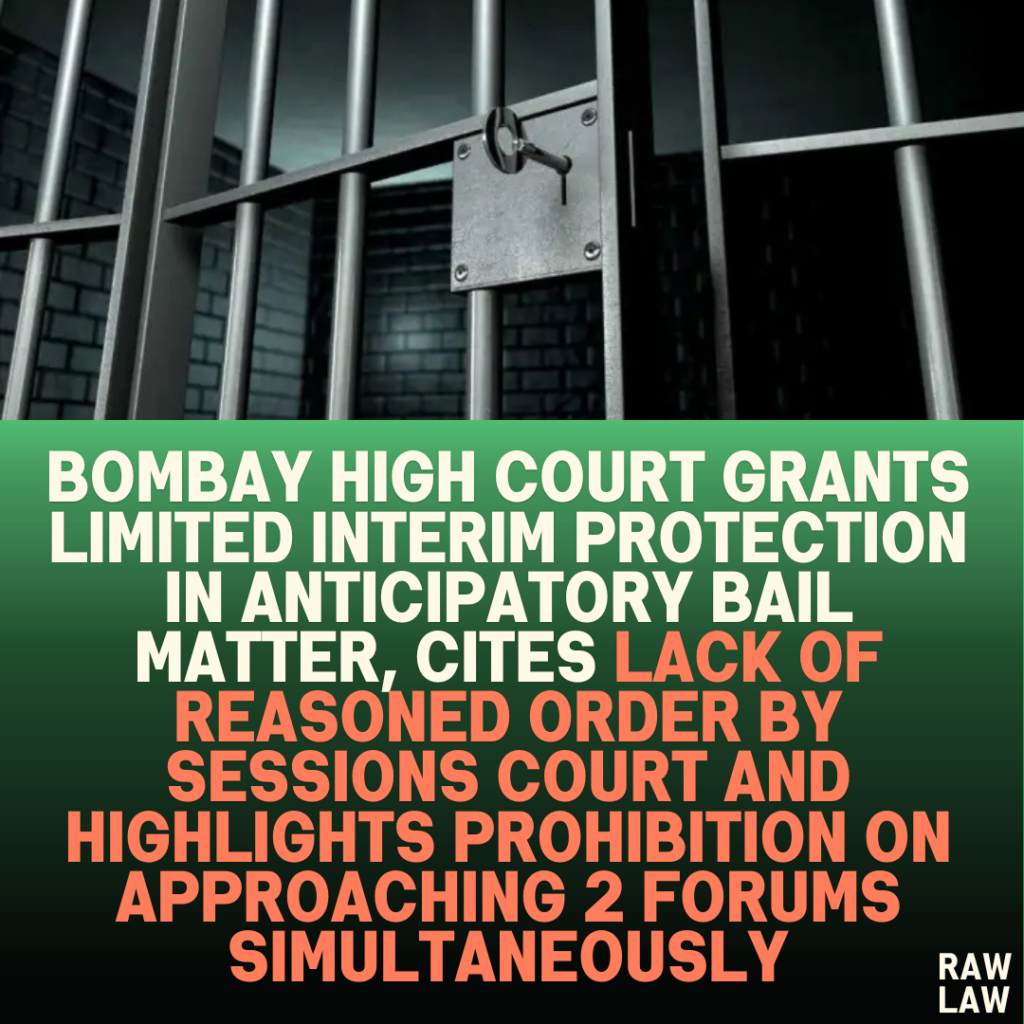Court’s Decision:
The Bombay High Court granted limited protection to the applicant from arrest until 16 October 2024, while the applicant’s anticipatory bail application is pending before the Sessions Court. The Court clarified that it has not examined the merits of the case and directed the learned Sessions Judge to decide the pending anticipatory bail application on its own merits and in accordance with law.
Facts:
The applicants had approached the Sessions Court, CBD Belapur, seeking anticipatory bail under Anticipatory Bail Application No. 710 of 2024, filed on 1 October 2024. The learned Sessions Court neither granted the ad-interim protection to the applicants nor rejected the application, leading the applicants to approach the High Court. The Sessions Court adjourned the matter without assigning any reasons or passing any order, leaving the applicants without interim relief.
Issues:
- Whether an applicant can seek interim protection from the High Court when the matter is already pending before the Sessions Court.
- Whether the lack of an order from the Sessions Court justifies the applicant’s approach to the High Court.
Petitioner’s Arguments:
The petitioner argued that since the Sessions Court had not provided any protection nor stated any reasons for adjourning the matter, it created a situation where the applicant was left vulnerable to arrest. Therefore, a limited interim protection from the High Court was sought until the Sessions Court decides on the pending application.
Respondent’s Arguments:
The respondent contended that since the matter was already pending before the Sessions Court, the applicant’s approach to the High Court amounted to forum shopping and a duplication of reliefs, which is legally impermissible.
Analysis of the Law:
The High Court observed that while the legal principle prohibits a party from seeking identical relief from two forums with concurrent jurisdiction, in this case, the approach to the High Court was necessitated due to the absence of any order or reasons from the Sessions Court. The court emphasized the need for judicial orders to be reasoned and not arbitrary.
Precedent Analysis:
No specific precedents were cited in the judgment. However, the principle that a party cannot approach two forums concurrently without just cause is a settled position in law.
Court’s Reasoning:
The High Court reasoned that while the applicant’s approach to the High Court would typically be prohibited, the circumstances of the case warranted limited protection. Since the Sessions Court had failed to pass any order or provide reasoning for its adjournment, it effectively left the applicants in a vulnerable position. The High Court, therefore, found it appropriate to extend limited protection until the Sessions Court adjudicates the pending application.
Conclusion:
The High Court granted interim protection to the applicants from arrest until 16 October 2024, and directed the Sessions Court to decide the pending anticipatory bail application on its own merits. The High Court clarified that its order was not on the merits of the case and should not influence the Sessions Court’s decision.
Implications:
This decision emphasizes the obligation of subordinate courts to pass reasoned orders and avoid arbitrary adjournments. It highlights that the absence of such orders can compel higher courts to intervene, even if it involves concurrent jurisdiction. The case also reinforces the principle that approaching multiple forums should be avoided unless exceptional circumstances justify such a move.



